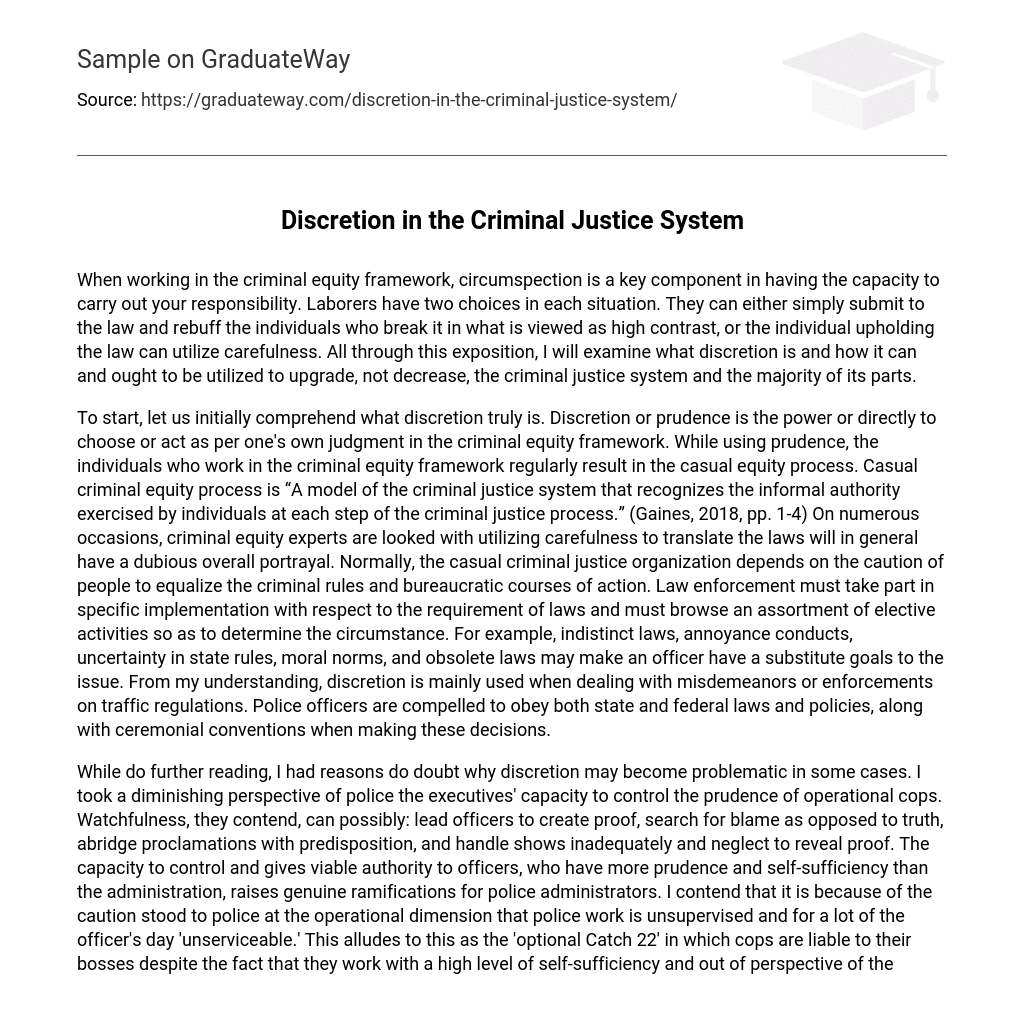When working in the criminal equity framework, circumspection is a key component in having the capacity to carry out your responsibility. Laborers have two choices in each situation. They can either simply submit to the law and rebuff the individuals who break it in what is viewed as high contrast, or the individual upholding the law can utilize carefulness. All through this exposition, I will examine what discretion is and how it can and ought to be utilized to upgrade, not decrease, the criminal justice system and the majority of its parts.
To start, let us initially comprehend what discretion truly is. Discretion or prudence is the power or directly to choose or act as per one’s own judgment in the criminal equity framework. While using prudence, the individuals who work in the criminal equity framework regularly result in the casual equity process. Casual criminal equity process is “A model of the criminal justice system that recognizes the informal authority exercised by individuals at each step of the criminal justice process.” (Gaines, 2018, pp. 1-4) On numerous occasions, criminal equity experts are looked with utilizing carefulness to translate the laws will in general have a dubious overall portrayal. Normally, the casual criminal justice organization depends on the caution of people to equalize the criminal rules and bureaucratic courses of action. Law enforcement must take part in specific implementation with respect to the requirement of laws and must browse an assortment of elective activities so as to determine the circumstance. For example, indistinct laws, annoyance conducts, uncertainty in state rules, moral norms, and obsolete laws may make an officer have a substitute goals to the issue. From my understanding, discretion is mainly used when dealing with misdemeanors or enforcements on traffic regulations. Police officers are compelled to obey both state and federal laws and policies, along with ceremonial conventions when making these decisions.
While do further reading, I had reasons do doubt why discretion may become problematic in some cases. I took a diminishing perspective of police the executives’ capacity to control the prudence of operational cops. Watchfulness, they contend, can possibly: lead officers to create proof, search for blame as opposed to truth, abridge proclamations with predisposition, and handle shows inadequately and neglect to reveal proof. The capacity to control and gives viable authority to officers, who have more prudence and self-sufficiency than the administration, raises genuine ramifications for police administrators. I contend that it is because of the caution stood to police at the operational dimension that police work is unsupervised and for a lot of the officer’s day ‘unserviceable.’ This alludes to this as the ‘optional Catch 22’ in which cops are liable to their bosses despite the fact that they work with a high level of self-sufficiency and out of perspective of their managers. An incongruity inside law requirement exists in light of the fact that while a law implementation structure is not quite the same as the military, the police still have a semi military structure. To additionally muddle matters, inside policing explicitly, sergeants have an expanded job in organization, which has restricted their capacity to give supervision in the city. At last, this does not take into consideration close supervision of junior officers who are compelled to practice their circumspection frequently without the advantage of the shrewdness of experienced chiefs. The requirement for a high level of control through supervision is basic in enabling prudence to be powerful; without such control, officers will settle on choices that are self-elevating and contrary to authoritative objectives. Direct supervision and control are a troublesome assignment for forefront directors who are looked with an expanded outstanding burden.
In conclusion, I have determined that proper use of discretion will effectively allow the state to save resources while enforcing only the violations that the public want enforced. Police require the ability to use discretion because of the inevitable deficiency of police assets to enforce all laws all the time. While police services unremittingly lack the resources to formally enforce all laws, they must, as a result, allow officers to determine which laws will be enforced at the operative level. While discretion creates an efficient system, the proper operational decisions must be made at the lower levels of the hierarchy, which will benefit the agency by fostering leadership throughout the organization. Therefore, after much consideration, I have determined that discretion as a whole is not entirely an unscrupulous mechanism when used both applicably and decorously.





